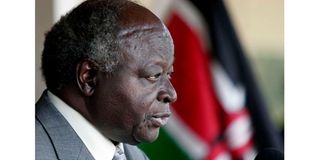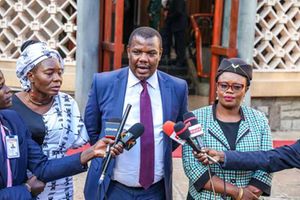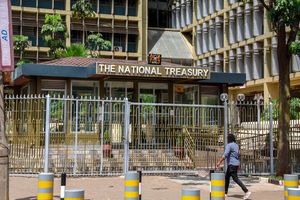Leaders: The Kibaki we knew

In this file photo taken on January 03, 2008 Kenyan President Mwai Kibaki reads a statement to members of the press in Nairobi.
Away from the public glare, people who worked closely with Mwai Kibaki, who died on Friday aged 90, have revealed the unknown side of Kenya’s third President.
Nyandarua Governor Francis Kimemia, who worked as the Head of Public Service and Secretary to the Cabinet during his tenure, said yesterday the public underrated Kibaki’s working style.
Mr Kimemia said that while he was quiet, his achievements were visible.
“He was a change agent, a revolutionary who worked quietly but the results were out for everyone to see. Look at the transformation he brought in the public service and the economy. People only got to appreciate all these when he left office,” he said.
Bungoma Senator Moses Wetang’ula, who was Foreign Affairs minister under Kibaki, described him as a mentor and a father figure.
“Kibaki had a pan-Africanist approach on issues of peace in the continent. To me, he ranks above the four Presidents we have had due to his commitment in rooting out corruption, to economic and infrastructural development and how he avoided reckless borrowing,” Mr Wetang’ula said.
Siaya Senator James Orengo called Kibaki an exceptional debater during their time together in the National Assembly.
“I used to enjoy it when he was giving a speech in Parliament. He gave the most eloquent speeches in the House. He had the gift of the gab. He reminds me that there can be decency in politics and not just noise,” Mr Orengo said.
Kitui Governor Charity Ngilu, once Kibaki’s Health minister, described the death of Kibaki as a great personal loss.
President Kibaki, Ms Ngilu said, guided her political path from the time she was first elected in 1992.
“He guided me when I was just a young MP who knew nothing. Viewing his body brings the memories of a person who loved this country and was interested in seeing this country grow,” she said.
“He never believed in handouts. Even when we went with him to campaigns, he never talked about the money he would give to people but he would tell people that everybody would have an opportunity to work.”
For his son Jimmy Kibaki, the country’s third President, who was MP from 1963 to 2013, was still the father he loved.
“For Mzee, his family came first and that is what most people don’t know about him. One of the memories is when we went for a holiday in Mombasa and we were just in the sea. Those were the moments for me,” he said.
Ethics and Anti-Corruption Commission (EACC) chief executive Twalib Mbarak described Kibaki as a person who respected institutions during his reign.
“During his tenure, issues like land grabbing were not rampant. Things were in order,” Mr Mbarak said.
Florence Kajuju, the chairperson of the Commission on Administrative Justice, said Kibaki believed in women’s leadership and their participation in the electoral process.
“He gave me my first job to serve in the energy tribunal. He recognised my ability in leadership when I was serving as the vice-chairperson of the Law Society of Kenya and we were agitating for a new Constitution,” Ms Kajuju said.
“He was a very accommodative leader who believed in the potential of each person and he would give you a chance, especially women, in the electoral process.”
Kieni MP Kanini Kega said he first met Kibaki in 1989 when he was still a student and desired to run for the Kieni parliamentary seat but the former President advised him to complete university first before venturing into politics.
“He advised me not to rush into leadership. I obliged and I’m happy after that. I was elected, re-elected and now I’m now going to be elected again for the third term courtesy of his advice,” Mr Kega said.
Mr Kega said the former President not only transformed the economy but also enabled infrastructure development, including improving rural roads.
“It is an undisputed fact that he transformed our economy because he did not like laziness and thieves around him. He insisted that when you are given a job, you should serve the public and not enrich yourself,” he said.
Karachuonyo MP Adipo Okuome said Kibaki’s approach to the economy bore fruit, boosting growth and reducing inflation.
“I hope we will get a replacement leader in the forthcoming elections to wake up our economy like he did,” Mr Okuome said.
Media Council of Kenya (MCK) chairman Maina Muiruri said Kibaki was not a coward as some people thought.
Mr Maina, with two decades of experience in journalism, said he interviewed Kibaki in 1995.
“He was two in one – what the public saw and his private life. Those who knew his public side only thought he was a coward but he was not. He was a hardworking and strict man,” Mr Maina said.
The public will view Kibaki’s body at Parliament buildings until tomorrow as it lies in state ahead of the state funeral on Friday and his burial on Saturday at his home in Othaya, Nyeri County.





